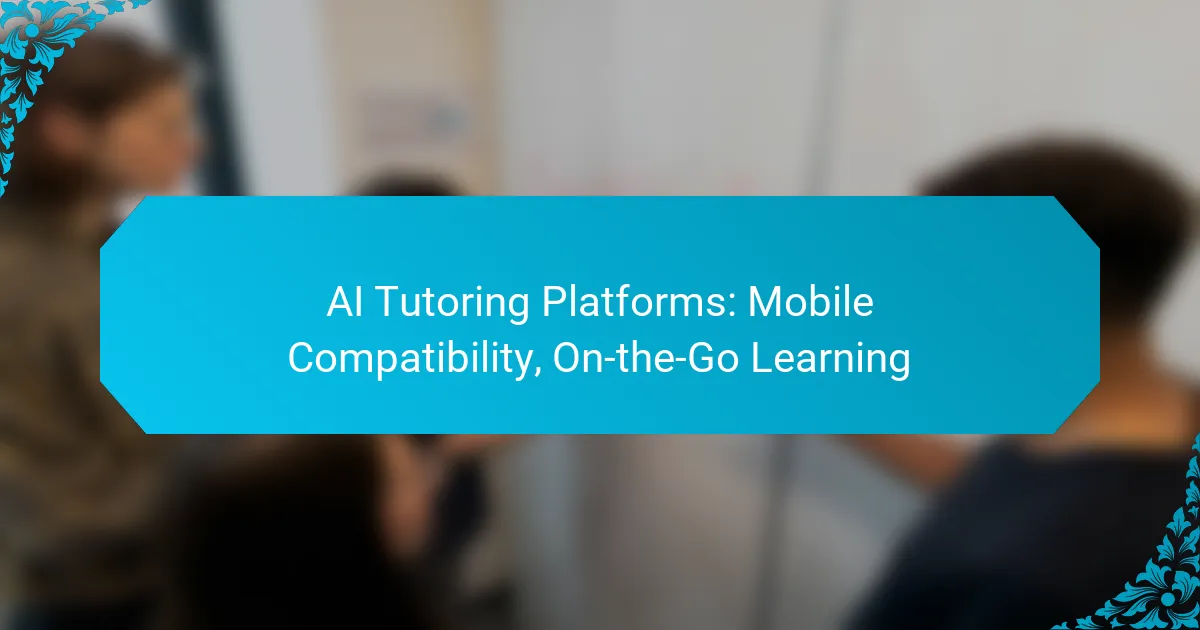AI tutoring platforms are increasingly mobile compatible, enabling learners to access educational resources anytime and anywhere. This on-the-go learning approach enhances convenience and accessibility, allowing users to engage with personalized content that adapts to their individual needs. With features like instant feedback and offline capabilities, these platforms make education more effective and engaging for everyone.
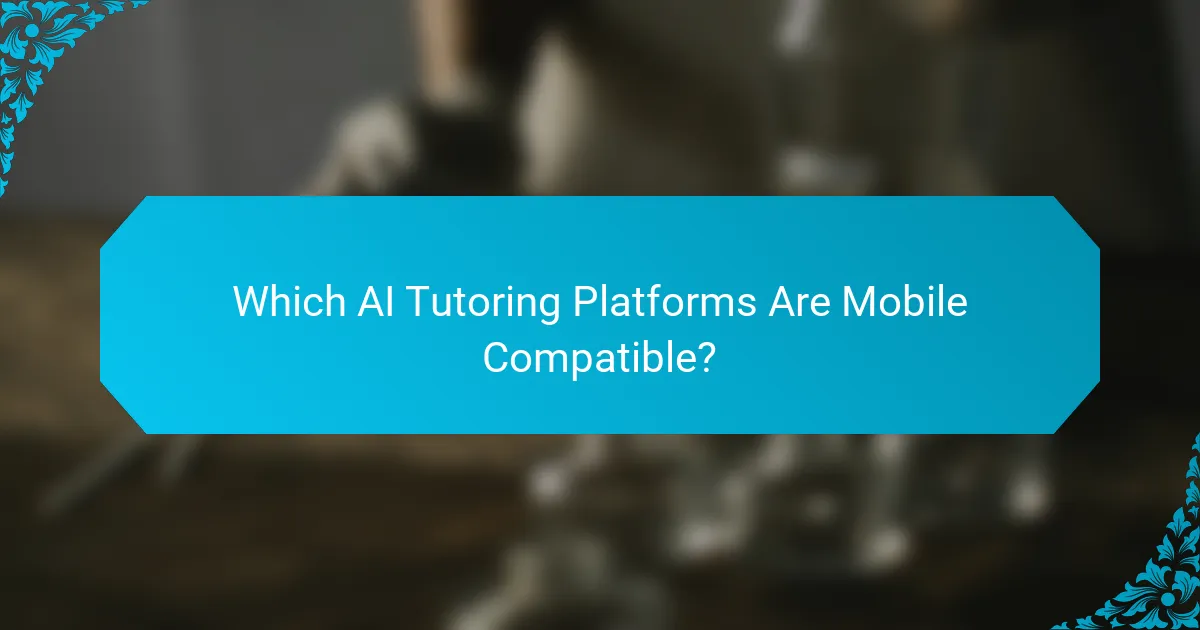
Which AI Tutoring Platforms Are Mobile Compatible?
Many AI tutoring platforms are designed to be mobile compatible, allowing learners to study on-the-go. This flexibility is essential for users who want to access educational resources anytime and anywhere, making learning more convenient and accessible.
Duolingo
Duolingo is a popular language-learning platform that offers a fully functional mobile app. Users can practice vocabulary, grammar, and pronunciation through interactive exercises, making it easy to learn in short sessions during commutes or breaks.
The app’s gamified approach keeps learners engaged, and it tracks progress over time. Duolingo is free to use, with optional in-app purchases for additional features.
Khan Academy
Khan Academy provides a comprehensive educational experience through its mobile app, which covers a wide range of subjects. Users can access instructional videos, practice exercises, and personalized learning dashboards directly from their smartphones.
The platform is entirely free, making it an excellent resource for students of all ages. The mobile compatibility allows for learning at one’s own pace, whether at home or on the move.
Chegg Tutors
Chegg Tutors offers mobile access to tutoring services, connecting students with tutors for real-time help. The app allows users to schedule sessions, ask questions, and receive assistance in various subjects, making it convenient for on-the-go learning.
While Chegg Tutors requires a subscription for full access, it provides a free trial for new users to evaluate its services. This flexibility can be particularly beneficial for students needing immediate help while away from home.
Wyzant
Wyzant connects students with qualified tutors through its mobile platform, allowing users to find and book tutoring sessions easily. The app features profiles of tutors, including their specialties and hourly rates, enabling informed choices.
While Wyzant does not charge a subscription fee, students pay tutors directly, which can vary widely based on expertise and location. This model allows for personalized learning experiences tailored to individual needs.
Brainly
Brainly is a peer-to-peer learning platform that encourages students to ask and answer questions across various subjects. The mobile app allows users to engage with a community of learners, making it easy to seek help while on the go.
Brainly is free to use, but it also offers a subscription for an ad-free experience and additional features. The collaborative nature of the platform fosters a supportive learning environment, ideal for quick help during busy schedules.
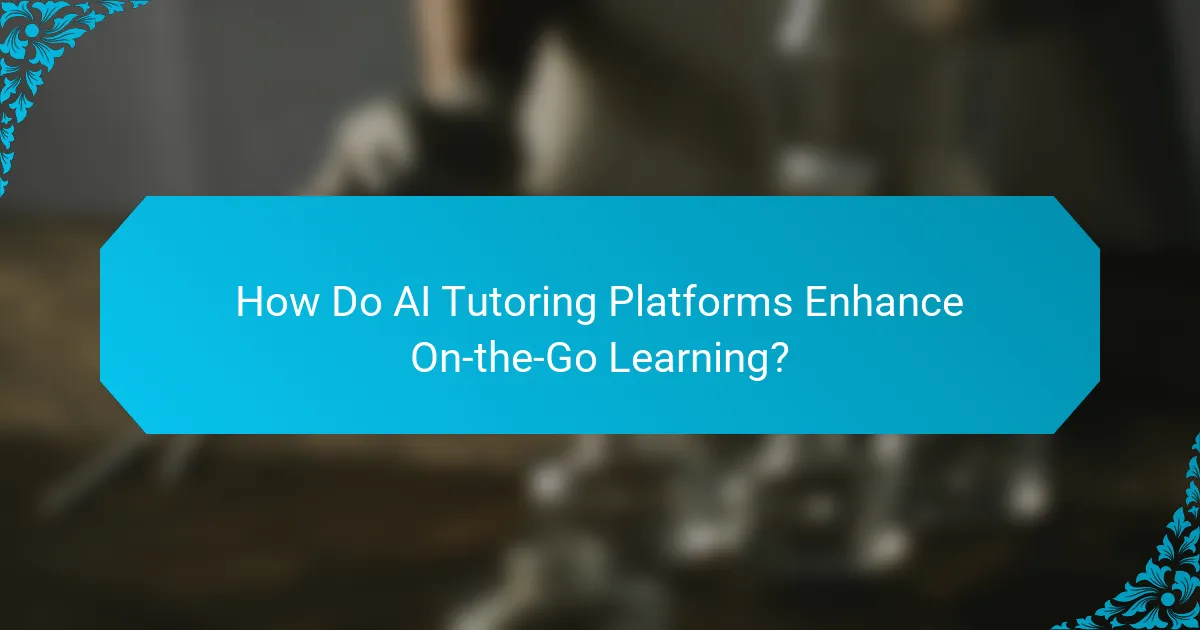
How Do AI Tutoring Platforms Enhance On-the-Go Learning?
AI tutoring platforms significantly improve on-the-go learning by providing personalized educational experiences that adapt to individual needs. These platforms leverage advanced algorithms to offer tailored content, instant feedback, and offline capabilities, making learning accessible anytime and anywhere.
Personalized Learning Paths
Personalized learning paths in AI tutoring platforms allow users to engage with material that matches their unique learning styles and paces. By analyzing user performance and preferences, these systems create customized curricula that focus on areas needing improvement while advancing through topics the learner excels in.
For instance, a student struggling with algebra may receive targeted exercises and resources, while another who excels in reading comprehension may be directed towards advanced literature analysis. This tailored approach keeps learners motivated and enhances retention.
Instant Feedback Mechanisms
Instant feedback mechanisms are crucial in AI tutoring platforms, enabling learners to receive immediate responses to their queries and exercises. This real-time interaction helps students identify mistakes and understand concepts more deeply, promoting a more effective learning process.
For example, when a student answers a math problem incorrectly, the platform can instantly provide hints or explanations, allowing the learner to correct their misunderstanding on the spot. This immediate reinforcement can significantly boost confidence and comprehension.
Offline Access Features
Offline access features are essential for on-the-go learning, allowing users to download lessons and materials for use without an internet connection. This capability is particularly beneficial for learners in areas with limited connectivity or those who prefer studying during commutes.
Many AI tutoring platforms offer downloadable content, enabling users to continue their education in various settings, such as on public transport or in remote locations. Ensuring that downloaded materials are up-to-date and relevant is vital for maximizing the effectiveness of offline learning.
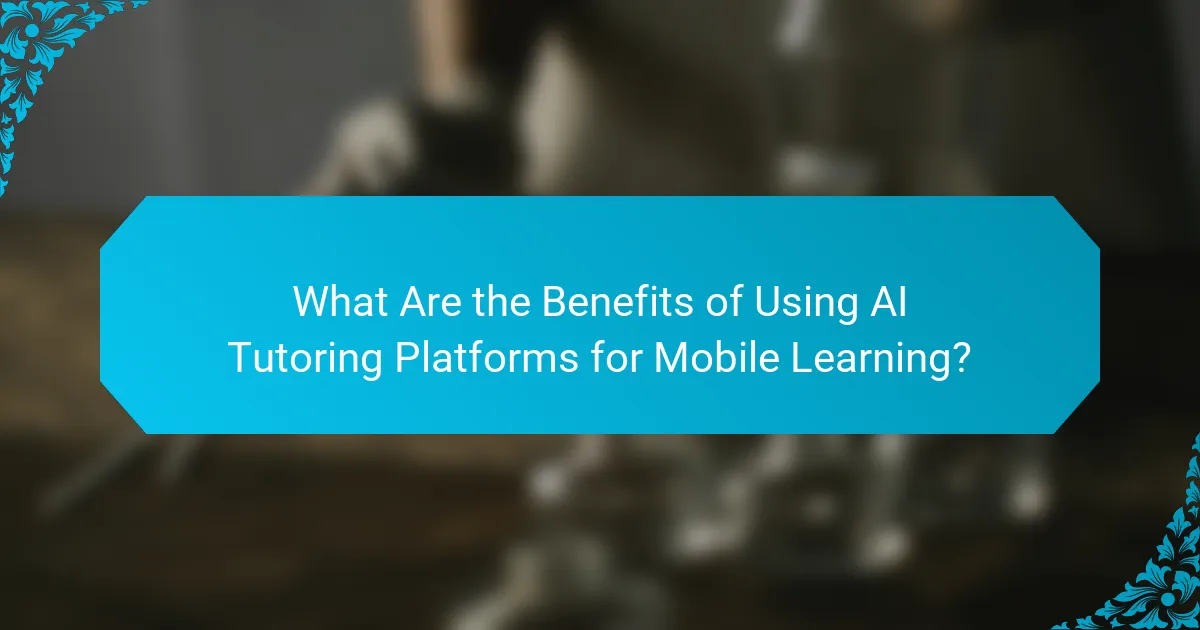
What Are the Benefits of Using AI Tutoring Platforms for Mobile Learning?
AI tutoring platforms enhance mobile learning by providing personalized, accessible education anytime and anywhere. These platforms leverage artificial intelligence to adapt to individual learning styles, making education more effective and engaging.
Flexibility in Learning
Mobile compatibility allows learners to study at their convenience, fitting education into busy schedules. Whether commuting, waiting in line, or taking a break, students can access lessons and materials on their smartphones or tablets.
This flexibility supports various learning environments, enabling users to choose when and where they learn best. For example, a student might review math concepts during a lunch break or practice a language while traveling.
Access to Diverse Resources
AI tutoring platforms often provide a wide range of resources, including videos, interactive quizzes, and reading materials. This variety caters to different learning preferences, helping students engage with content in ways that suit them best.
Many platforms also curate resources from reputable sources, ensuring that learners have access to high-quality information. This can include everything from academic articles to practical exercises, all available on mobile devices.
Real-Time Assistance
One of the key advantages of AI tutoring platforms is the ability to receive real-time assistance. Students can ask questions and get instant feedback, which helps clarify doubts immediately and reinforces learning.
Some platforms utilize chatbots or virtual tutors that are available 24/7, providing support whenever needed. This immediacy can significantly enhance the learning experience, allowing for continuous progress without delays.
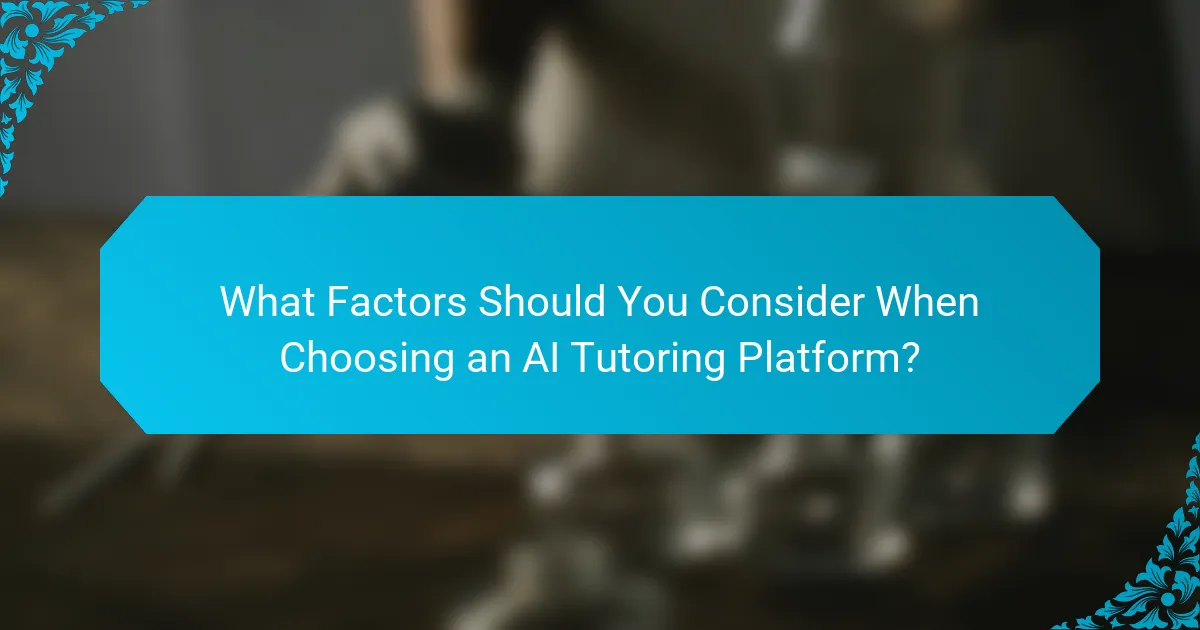
What Factors Should You Consider When Choosing an AI Tutoring Platform?
When selecting an AI tutoring platform, consider user interface, content quality, and pricing models. These factors significantly influence the effectiveness and accessibility of your learning experience.
User Interface and Experience
A user-friendly interface is crucial for a seamless learning experience. Look for platforms that offer intuitive navigation, clear layouts, and responsive designs, especially for mobile use. A well-designed interface can enhance engagement and reduce frustration.
Consider features like customizable dashboards and progress tracking. These tools help you monitor your learning journey and adjust your study habits accordingly. Platforms that provide a mobile app can offer additional convenience for on-the-go learning.
Content Quality and Variety
The quality and variety of content available on an AI tutoring platform are essential for comprehensive learning. Ensure the platform covers a wide range of subjects and offers diverse formats, such as videos, quizzes, and interactive exercises. This variety caters to different learning styles and keeps the material engaging.
Check for up-to-date resources and materials that align with current educational standards. Platforms that partner with reputable educational institutions often provide higher quality content. User reviews can also give insight into the effectiveness of the material offered.
Pricing Models
Pricing models can vary widely among AI tutoring platforms, so it’s important to understand what you’re paying for. Some platforms offer subscription-based pricing, while others may charge per course or provide a one-time payment option. Evaluate which model aligns best with your learning goals and budget.
Look for platforms that offer free trials or money-back guarantees. This allows you to test the service before committing financially. Be cautious of hidden fees or costs for additional features, as these can significantly increase your overall expenditure.

How Do AI Tutoring Platforms Compare in Terms of Pricing?
AI tutoring platforms vary significantly in pricing, influenced by features, subscription models, and target audiences. Users can find options ranging from free services to premium subscriptions, each offering different levels of access and support.
Subscription Costs
Subscription costs for AI tutoring platforms typically range from around $10 to $50 per month, depending on the features included. Some platforms offer tiered pricing, where basic access is cheaper, while advanced features like personalized tutoring or additional resources come at a higher price.
For example, a platform may charge $15 per month for basic access, while a premium plan could be priced at $40 per month, providing more extensive learning materials and one-on-one sessions. Always evaluate what you need before committing to a subscription.
Free vs Paid Features
Many AI tutoring platforms offer a mix of free and paid features. Free versions often include basic lessons and quizzes, while paid subscriptions typically unlock advanced tools such as personalized learning paths, detailed progress tracking, and interactive tutoring sessions.
When considering whether to go for a free or paid option, assess your learning goals. If you require more tailored support or extensive resources, investing in a paid plan may be worthwhile. However, for casual learners, free features might suffice.
